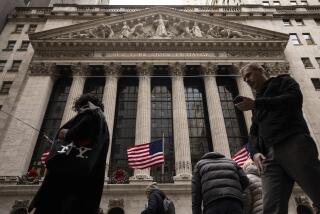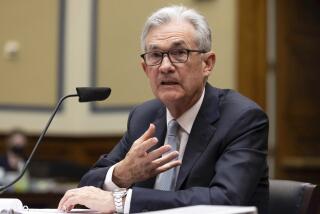Economists in Survey Say Recession Unlikely in ’88
- Share via
WASHINGTON — The October stock market crash will contribute to a significant slowdown in economic growth this year, but the country should be able to avoid a recession, economists for top U.S. corporations predicted Monday.
The National Assn. of Business Economists said its latest member survey found economists in a more upbeat mood than three months ago, when more than half said the record fall in stock prices Oct. 19 would lead to a recession in 1988.
In the latest survey, the number forecasting a recession this year had dropped to one-fourth, good news for Republicans hoping to hold on to the White House. But an overwhelming 83% of the analysts said a downturn was very likely before the end of the next President’s first year in office.
“Back in November there was a great deal of nervousness about what Oct. 19 meant to the economy,” said Kathleen Cooper, who briefed reporters on the new forecast. “Since that time, we have had good Christmas sales, good employment growth, and consumer confidence surveys have improved. These things make economists feel better about the future.”
‘Slower Growth’
While the next President will likely have to deal with a recession early in his first term, the economists said they expected the economy this year to expand at a modest pace of 2%, as measured by the gross national product.
This would be about half of the 3.9% GNP growth turned in during 1987. The Reagan Administration, by contrast, is more optimistically forecasting 2.4% GNP growth this year, when measured from the fourth quarter of 1987.
“Even though most of us don’t expect a recession, we will have much slower growth than in 1987,” said Cooper, who is chief economist for Security Pacific National Bank of Los Angeles. She said the stock market decline had caused many economists to slash their GNP forecasts by 0.5% to 1%.
In other predictions, the survey results from 200 economists found:
- Unemployment will creep up this year because of the sluggish growth forecasts, rising to 6.1% from the current 5.8% level by the end of the year.
- Inflation will remain under control, with consumer prices rising 4.2% this year, a bit slower than the 4.4% consumer inflation recorded in 1987.
- The federal budget deficit will rise to $157 billion in the current fiscal year. But it will then resume falling, dropping to $140 billion by 1990. This is more pessimistic than the Reagan Administration prediction, which puts this year’s deficit at $146.7 billion, a further improvement from the $150.4-billion 1987 deficit.
- The foreign trade deficit, which hit a record $171 billion last year, will finally start coming down, dipping to $150 billion this year and $130 billion in 1989. Half of this year’s overall growth will come from improvements in the trade deficit, the economists said.
- Interest rates will hold steady, ending the year at about where they are now. Banks cut their prime rate, used to set interest rates on a variety of corporate and consumer loans, to 8.5% in early February, and analysts forecast that this would be the rate in effect at year’s end.
Cooper said the optimistic outlook for interest rates stemmed in part from a belief that the Federal Reserve would be easing its grip on the money supply in the first half of the year in an effort to keep the recovery alive.
She said more than two-thirds of the economists believed that the Fed would ease credit conditions in the next six months, with one-fourth of the analysts looking for a cut in the discount rate, the interest the Fed charges to make bank loans.
Cooper said the economists believe that the dollar, which has at times fallen sharply on foreign currency exchanges, will stabilize this year, with only one-fifth of the analysts expecting a decline of 10% or more. Just three months ago, more than 40% of the economists were forecasting a decline in the dollar that was at least that large.
More to Read
Inside the business of entertainment
The Wide Shot brings you news, analysis and insights on everything from streaming wars to production — and what it all means for the future.
You may occasionally receive promotional content from the Los Angeles Times.










